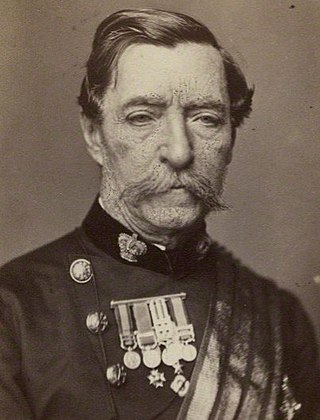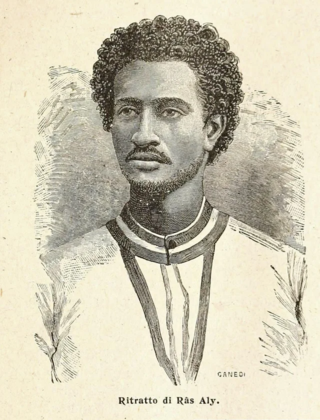Related Research Articles

Mengistu Haile Mariam is an Ethiopian former politician and former military officer who was the head of state of Ethiopia from 1977 to 1991 and General Secretary of the Workers' Party of Ethiopia from 1984 to 1991. He was the chairman of the Derg, the Marxist-Leninist military junta that governed Ethiopia, from 1977 to 1987, and the president of the People's Democratic Republic of Ethiopia (PDRE) from 1987 to 1991.

Ethiopia, officially the Federal Democratic Republic of Ethiopia, is a landlocked country located in the Horn of Africa region of East Africa. It shares borders with Eritrea to the north, Djibouti to the northeast, Somalia to the East, Kenya to the South, South Sudan to the West, and Sudan to the Northwest. Ethiopia covers a land area of 1,112,000 square kilometres. As of 2024, it is home to around 109 million inhabitants, making it the 13th-most populous country in the world, the 2nd-most populous in Africa after Nigeria, and the most populated landlocked country on Earth. The national capital and largest city, Addis Ababa, lies several kilometres west of the East African Rift that splits the country into the African and Somali tectonic plates.

Field Marshal Robert Cornelis Napier, 1st Baron Napier of Magdala was a British Indian Army officer. He fought in the First Anglo-Sikh War and the Second Anglo-Sikh War before seeing action as chief engineer during the second relief of Lucknow in March 1858 during the Indian Rebellion of 1857. He also served in the Second Opium War as commander of the 2nd division of the expeditionary force which took part in the Battle of Taku Forts, the surrender of Peking's Anting Gate and the entry to Peking in 1860. He subsequently led the punitive expedition to Abyssinia in July 1867, defeating the Emperor Tewodros II of Ethiopia with minimal loss of life among his own forces and rescuing the hostages of Tewodros.

The Maria Theresa thaler (MTT) is a silver bullion coin and a type of Conventionsthaler that has been used in world trade continuously since it was first minted in 1741. It is named after Maria Theresa who ruled Austria, Hungary, and Bohemia from 1740 to 1780 and is depicted on the coin.

Tewodros II was Emperor of Ethiopia from 1855 until his death in 1868. His rule is often placed as the beginning of modern Ethiopia and brought an end to the decentralized Zemene Mesafint.

The Derg, officially the Provisional Military Administrative Council (PMAC), was the military dictatorship that ruled Ethiopia, then including present-day Eritrea, from 1974 to 1987, when the military leadership or junta formally "civilianized" the administration but stayed in power until 1991.
Tewodros I, throne name Walda Anbasa was Emperor of Ethiopia from 1413 to 1414, and a member of the Solomonic dynasty. He was the son of Dawit I by Queen Seyon Mangasha.
Metemma, also known as Metemma Yohannes, is a town in northwestern Ethiopia, on the border with Sudan. Located in the Semien Gondar Zone of the Amhara Region, Metemma has a latitude and longitude of 12°58′N36°12′E with an elevation of 685 meters above sea level. Across the border is the corresponding Sudanese village of Gallabat. According to the British diplomat Hormuzd Rassam, who travelled through Metemma in November 1865 on his diplomatic mission to Emperor Tewodros II, "Metemma" comes from the Arabic word for "the place of cutting, or termination – indicating the end of the Muslim provinces", although at the time the settlement was better known as Suk ul-Gallabat.

Debre Tabor is a town and woreda in northern Ethiopia. Located in the Debub Gondar Zone of the Amhara Region, about 100 kilometers southeast of Gondar and 50 kilometers east of Lake Tana, this historic town has a latitude and longitude of 11°51′N38°1′E with an elevation of 2,706 metres (8,878 ft) above sea level. The presence of at least 48 springs in the area contributed to the development of Debre Tabor.

Ali II of Yejju was Ras of Begemder and the de facto ruler of the Ethiopian Empire. He was a member of a powerful Welo dynasty known as the Yejju, which ruled much of the Ethiopian Empire during the Zemene Mesafint.

The British Expedition to Abyssinia was a rescue mission and punitive expedition carried out in 1868 by the armed forces of the British Empire against the Ethiopian Empire. Emperor Tewodros II of Ethiopia, then often referred to by the anglicized name Theodore, imprisoned several missionaries and two representatives of the British government in an attempt to force the British government to comply with his requests for military assistance. The punitive expedition launched by the British in response required the transportation of a sizeable military force hundreds of kilometres across mountainous terrain lacking any road system. The formidable obstacles to the action were overcome by the commander of the expedition, General Robert Napier, who captured the Ethiopian capital, and rescued all the hostages.

The Zemene Mesafint was a period in Ethiopian history between the mid-18th and mid-19th centuries when the country was ruled by a class of Oromo elite noblemen who replaced Habesha nobility in their courts, making the emperor merely a figurehead. For the most part, the regional lords were tightly related by marriage and constituted a stable ruling elite that prevailed until the mid-20th century. In short, during the Zemene Mesafint, the emperors from the Solomonic dynasty were reduced to little more than figureheads confined to the capital city of Gondar.
Bekele is an Ethiopian paternal name which may refer to:
The trade unions of Ethiopia have a total membership of approximately 300,000. Over 203,000 are members of the Confederation of Ethiopian Trade Unions (CETU).

Ethiopia is one of the oldest countries in Africa; the emergence of Ethiopian civilization dates back thousands of years. Abyssinia or rather "Ze Etiyopia" was ruled by the Semitic Abyssinians (Habesha) composed mainly of the Amhara, Tigrayans and the Cushitic Agaw. In the Eastern escarpment of the Ethiopian highlands and more so the lowlands were the home of the Harari/Harla that founded Sultanates such as Ifat and Adal and the Afars. In the central and south were found the ancient Sidama and Semitic Gurage, among others.

Haile Fida was an Ethiopian politician and the leader of the All-Ethiopia Socialist Movement. His most significant accomplishment was drafting the Program for the National Democratic Revolution on behalf of the Derg.
Yasaffiw hezb dems was a newspaper in Ethiopia. It was the central organ of the All-Ethiopian Socialist Movement (Meison).
Abyotawit Seded was a communist organization in Ethiopia, formed in 1976 by a group of officers of the Derg military junta who had attended political trainings in the Soviet Union from 1975 and onwards.
Ashagre Yigletu is an Ethiopian economist, politician and diplomat.

Ethiopia–United Kingdom relations are the bilateral relations between Ethiopia and the United Kingdom. Currently, Ethiopia has an embassy in London and United Kingdom has an embassy in Addis Ababa. Historically, their relations traced over centuries covered a range of areas including, but not limited to, trade, culture, education and development cooperation. The UK is the first country to open its embassy in Addis Ababa. Ethiopia is the first African country to open an embassy in London.
References
- 1 2 3 Legum, Colin. The Horn of Africa in continuing crisis . New York; London: Africana, 1979. pp. 18, 46
- 1 2 Clapham Christopher. Transformation and Continuity in Revolutionary Ethiopia . Cambridge: Cambridge University Press, 1988. p. 67
- ↑ Teferra Haile-Selassie, The Ethiopian revolution, 1974 - 1991: from a monarchical autocracy to a military oligarchy . London [u.a.]: Kegan Paul Internat, 1997. p. 200
- ↑ Middle East Economic Digest . London: Middle East Economic Digest, 1977. p. 19